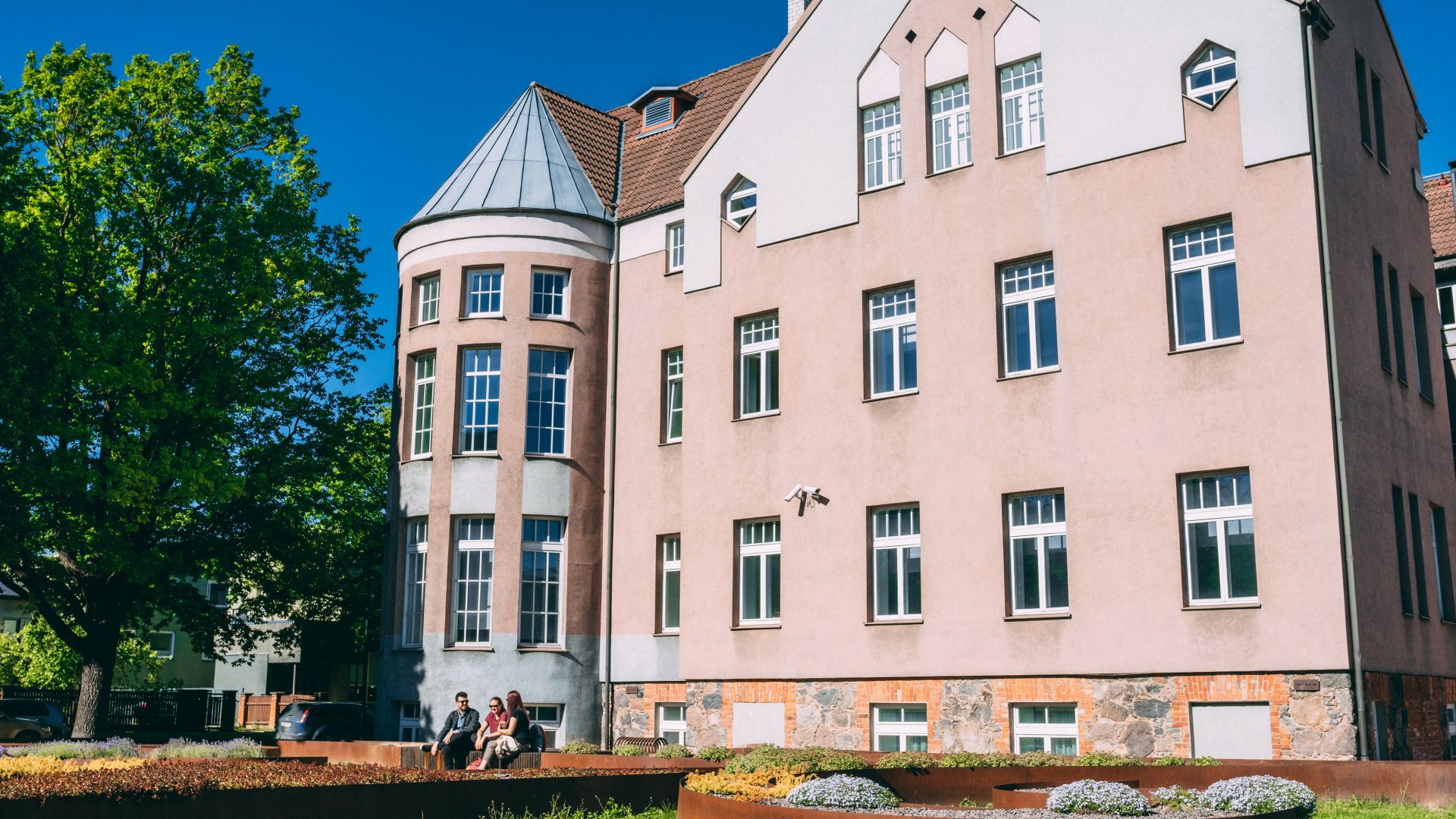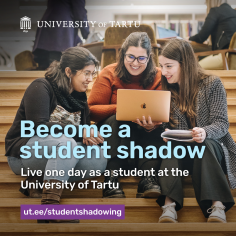Information Technology Law
Master's
2 January
15 March
30 April
1 September
- The programme is designed to provide both technical and legal skills for working as an IT lawyer.
- The programme is taught by academics and practitioners in the field.
- Take part in conferences, summer schools and competitions, provide legal services to the start-up community in the TechStartup Legal Clinic and work on current challenges in the IT Law Lab.
- Estonia is considered an international leader in IT for its e-solutions and openness to technological advancements.
The Information Technology Law programme is driven by the high demand for IT Law specialists in the private and public sector worldwide as well as by the ambitions of Estonia as a tech-savvy country and a forerunner in innovative digital initiatives.
Designed for lawyers interested in pursuing careers in information technology and cyber security, the programme trains highly qualified IT Law experts much needed at law firms, IT companies, public agencies, international organisations, and consulting firms.
Why study Information Technology Law?
- Knowledge and skills are tested in practice throughout the year. We believe that a significant part of teaching in this programme should simulate real-life situations. Students gain access to 30 IT Law practitioners and IT specialists worldwide participating in the programme. As consultants, lecturers, or mentors, they synchronise legal education with the technical developments in the ICT sector.
- Broad and comprehensive understanding of IT Law. We provide a systematic understanding of all major subfields of IT law and skills necessary for practising in this area. Along with that, we create extensive links between technical, legal, and policy aspects of development and uses of ICTs, putting heavy emphasis on case studies, real-life exercises, trend assessments, and problem-solving.
- Strong emphasis on developing technical skills. Students will master a set of technical skills typically required in the ICT sector, e.g. elementary skills in programming, cryptography, database technology, and software engineering.
- Principle-based learning allows practising IT Law globally. Graduates will be ready to provide legal advice on ICT related matters across jurisdictions and work anywhere in the world. They will be able to perform interdisciplinary and comprehensive regulatory, analytical, and expert work in the field of IT Law, having all necessary skills to face the challenges posed by the extraterritoriality, novelty, and complexity of its problems.
- e-Estonia and cutting-edge developments in IT. Estonia is considered an international leader in IT for its technological and legal solutions. Its population is known to be open to technological advancements: we provide access to its best practices and cutting-edge developments.
Follow the programme on Facebook.
Learning outcomes
Student who completes the programme:
- knows different specialities of IT Law, their interrelationships, fundamental principles, and how to apply them;
- chooses suitable methods for solving problems in the IT law field and evaluates the results of those choices by applying fundamental technical knowledge and skill;
- knows and uses in practice the relevant European Union (EU) and European Economic Area (EEA) regulations related to IT law and knows legal regulations and practices from certain non-European jurisdictions, particularly the USA;
- drafts legislative acts and various types of legal documents, as well as construes and applies law in the field of IT Law;
- analyses and reasons both verbal and written format in the field of IT Law;
- resolves legal matters in IT Law in the business sector, governmental sector, international organisations and elsewhere.
Programme highlights in video
- Watch the programme director talk about the master's programme in Information Technology Law during Virtual Open Day 2024.
- Watch the presentation about International master's admissions by the Head of International Admissions during Virtual Open Day 2024.
The courses take place from Thursday to Saturday.
Course and module details
This programme structure is the latest one confirmed by the university. Next year's modules will be updated by 15 April. Significant changes to the programme will be announced in advance on this website. Check the Study Information System for the latest updates.
Curriculum version:
More info: Study Information System

The School of Law is one of the four oldest faculties of the University of Tartu, where lawyers have been educated ever since the university was founded in 1632. It is the number one law school in Estonia and the Baltic states (see Rankings & Surveys).
Read more about the School of Law.
Graduates of the programme are information technology law specialists equipped with the necessary skills to successfully engage and excel in the process of legislative drafting and conduct both analytical and expert work in matters related to ICT. This is achieved particularly thanks to a strong emphasis on:
- Case-by-case research;
- Simulation of real-life situations;
- Evaluation of development tendencies;
- Problem centred approach.
The rapidly increasing importance and ubiquity of ICTs has created a concurrent need for lawyers adept at relevant technical matters in
- Law firms;
- ICT companies;
- Public agencies;
- International organisations;
- Consulting firms and
- Scientific institutions.
Admission requirements for Information Technology Law
- 4-year bachelor's degree or equivalent qualification of 240 ECTS in Law (must be obtained by the end of July); applicants with a 3-year bachelor's degree in Law (180 ECTS) must have a master's degree in Law to qualify – please see our country-specific document requirements.
English language proficiency – please see our acceptable tests and exempt categories.
NB! The restrictions for the citizens of the Russian Federation are specified here.
Applications are evaluated based on
- the score of the motivation letter (yields 50% of the final score)
- the admission interview (yields 50% of the final score)
Motivation Letter (in English, 4500-5000 characters with spaces) is a part of the online application form. Guidelines and evaluation criteria for the motivation letter are also included in the online application form.
We strongly advise you to familiarise yourself with the contents of the IT law programme before writing the motivation letter. With this in mind, please address the following questions in the letter:
- Whether and how are your previous education and/or experiences demonstrating your interest in the topics covered by the MA in IT Law curriculum?
- How do you plan to apply the knowledge and skills that you will acquire during your studies in IT Law?
- What is the most intriguing problem for you in the field of IT Law?
The letter will be evaluated on the basis of the following criteria:
- Match between the goals of the IT Law Program on the one hand and the intriguing problem raised in the motivation letter together with the education, the experiences, and the future prospects of the applicant on the other hand;
- Communication skills, analysis and argumentation.
The maximum score for motivation letter is 100 points and the result is positive only if the applicant gains 51 points or more.
Applicants who received a positive score (at least 51 points) for the motivation letter will be invited to take part in admission interview.
Admission interviews take place between 10-17 April, 2025.
The School of Law reserves the right to make changes in these dates.
The interview is designed to determine the applicant's readiness for learning in the field of IT law.
The applicant will be evaluated according to the following criteria:
- Acquaintance with the field of IT law
- Readiness for continous learning and professional developement
- Analysis, argumentation and communication skills
The duration of the interview is 15 minutes and it is conducted in English via Zoom. The interviews will be scheduled in cooperation with qualifying candidates when the motivation letters have been evaluated.
For the interview via Zoom the applicant needs the following:
- A computer or smart device.
In addition, the computer or smart device must have a web camera, earphones and microphone (built-in or separate).
As the applicant must be visually identified at the interview, the use of the web camera is mandatory, not recommended.
An internet connection with a speed of at least 1 Mb/s (upload/download) is recommended for the video call.
At the online interview:
- the applicant must have an identity document;
- the applicant has to ensure that the room where they stay is free from other persons or background noise;
- the applicant must take into account that they are not allowed to record the interview.
NB! The School of Law reserves the right to make changes to the schedule of the interviews. All applicants invited to the interview will be notified and provided with necessary instructions.
For each assignment, the maximum score is 100 points and minimum positive score 51 points. Only the candidates who receive at least 51 points from the motivation letter, will be invited to the interview. After the interview, the final admission score is calculated.
For each assignment, the maximum score is 100 points and minimum positive score 51 points. Only the candidates who receive at least 51 points from the motivation letter, will be invited to the interview. After the interview, the final admission score is calculated.
The application will be considered for admission if a score of 66 points or higher is achieved. For further information on assessing candidates´ academic performance and calculating admissions´ score see here.
How to apply
The following information applies to international students and Estonian students who graduated abroad:
The application system opens on 2 January and closes on 15 March. The following electronic documents must be submitted via DreamApply by 15 March:
- online application
- motivation letter
- official copy of the bachelor's diploma or its equivalent and Diploma Supplement (transcript) in the original language (must include a description of the grading scale).
NB! Applicants graduating in the upcoming spring/summer and having their diploma and final transcript issued later than the application deadline should electronically submit their most recent official transcript by the application deadline. The transcript should be supplemented by an official statement from the issuing institution indicating current enrollment and expected graduation date. Admitted candidates are required to post certified copies of their graduation documents as soon as these have been issued (must reach us no later than by the end of July). - official translation of the bachelor’s diploma and Diploma Supplement (transcript) into English, translation certified
- proof of English language proficiency
- copy of the passport page stating the applicant’s personal particulars
- confirmation/receipt of application fee payment (if applicable). All international applicants are required to pay the application fee EUR 100, unless they have completed the previous study level in Estonia. An application will only be processed after the fee has been received by the UT.
Submitted applications can not be edited. It is only possible to upload new documents (e.g. graduation certificates). Applicants will receive feedback and notifications through the DreamApply system to their e-mail. Incomplete applications or those submitted by e-mail will not be considered for admission.
Guide to submitting an electronic application on DreamApply.
NB: The University of Tartu has no official partnerships with agents or educational representatives. We strongly recommend applying directly to the university without the help of unauthorised third-party entities. Should you use such a service, please ensure that your application's contact information is your personal details (your e-mail, phone number, etc.).
The evaluation of applications will be made based on the electronic copies added to DreamApply. A general ranking list will be formed based on the electronically submitted applications and admission results (including offers) will be announced to all applicants personally via DreamApply by April 30 at the latest. Admitted candidates are expected to accept or decline the offer in DreamApply in 7 days. If the decision is not communicated to UT via DreamApply by the stipulated deadline, UT reserves the right to withdraw the admission offer.
NB! It is not possible to postpone the beginning of studies to the next academic year.
Terms and conditions of the admission offer
Admission offers are conditional. This means that there are conditions in the offer which the applicant needs to fulfil in order to be admitted (e.g. sending application documents by post; obtaining the required level of education). If the conditions are not met, UT has the right to withdraw the offer. Also, UT reserves the right to withdraw or amend any offer or revoke the matriculation of a student, if it becomes evident that the application contains fraudulent information, the qualification does not provide access to the chosen study programme or the student is found to have omitted key information from the application. Should such circumstances occur, UT will not be liable for any material or immaterial loss which the student may suffer as a result.
Once the admission results have been announced, all admitted students are required to send the application documents by post to: Student Admissions, University of Tartu, Ülikooli 18-133, Tartu 50090, ESTONIA.
The documents are expected to be mailed only by those receiving the admission offer (unless instructed otherwise by the admissions staff). The documents must reach the university within 3 weeks from the announcement of the offer. If the application documents do not reach us by the deadline, the university has the right to withdraw the admission offer. Applicants will be informed when their documents have arrived.
Requirements for educational documents
All copies of educational documents (diplomas and Diploma Supplements/transcripts) must be officially certified. By certified we mean that the copies should bear an original signature and seal of the authority certifying that these are true copies of the original document(s). The copies can be certified either 1) by an authorised official of the issuing institution, or 2) by a notary, or 3) with an Apostille attached. NB! Country-specific requirements may also specify the way documents from certain countries must be certified.
Please note that UT does not accept simple copies made on the basis of already certified copies (primary copies are needed).
All admitted students are required to present their original qualification certificates upon arrival (unless these were sent directly from the issuing institution).
Paying the tuition fee (applicable to those receiving a fee-based study place offer)
- EU/EEA/Swiss citizens are required to pay the fee for the first semester once they arrive in Tartu (by 20 September at the latest after signing the fee contract, please read more here).
- Admitted students from other countries are required to pre-pay half of the first semester's tuition fee. The invoice along with the pre-payment deadline and payment details will be sent to applicants via DreamApply after they have accepted the admissions offer and the University has received the hard copies of the application documents. Second part of the fee is due on 20 September. NB! The official admission letter (necessary for visa application) will only be issued once the University of Tartu has received the pre-payment.
- NB! Once you have been offered a fee-based study place, be aware that it will not be changed into a fee waiver study place. By transferring the pre-payment to the university, you confirm that you have informed yourself about the process of the visa and temporary residence permit application and you are able to arrive in Estonia by the start of the academic year. If you have any questions please contact studentvisasupport@ut.ee.
The official admission letter will be sent to admitted students electronically via DreamApply only after the admissions office has received and reviewed hard copies of the application documents, and received the tuition fee pre-payment (if a pre-payment was required, please see step 3 for more details).
NB! The electronic admission letter is also sufficient for non-EU students for applying for visa at an Estonian embassy.
Once the admission letter is issued, accepted students may proceed further with arranging their arrival. All non-EU students should first consult information on the process of visa and temporary residence permit application to be sure, as where and when the relevant documents need to be applied. Note that housing at the UT dormitories can be applied during a limited period of time, unless specified otherwise on the website.
NB! Admitted students who are not citizens of an EU or EEA country or Switzerland need to make sure they obtain the Estonian long-term visa on time in order to be able to participate in the orientation programme for international students held in the last week of August. They are also required to visit the Admissions Office in person to complete their arrival registration by September 1, 2025, at the latest. Failure to do so will result in the revocation of their admission decision and visa.
For housing alternatives please find further information on Tartu Welcome Centre website.
Travel information can be found here.
Based upon common queries, the most important information has been summarised into a pre-arrival information website UT Getting Started.
Estonian applicants should apply via National Admission Information Systems (SAIS). Further information in Estonian is available here.

07.02.2025






